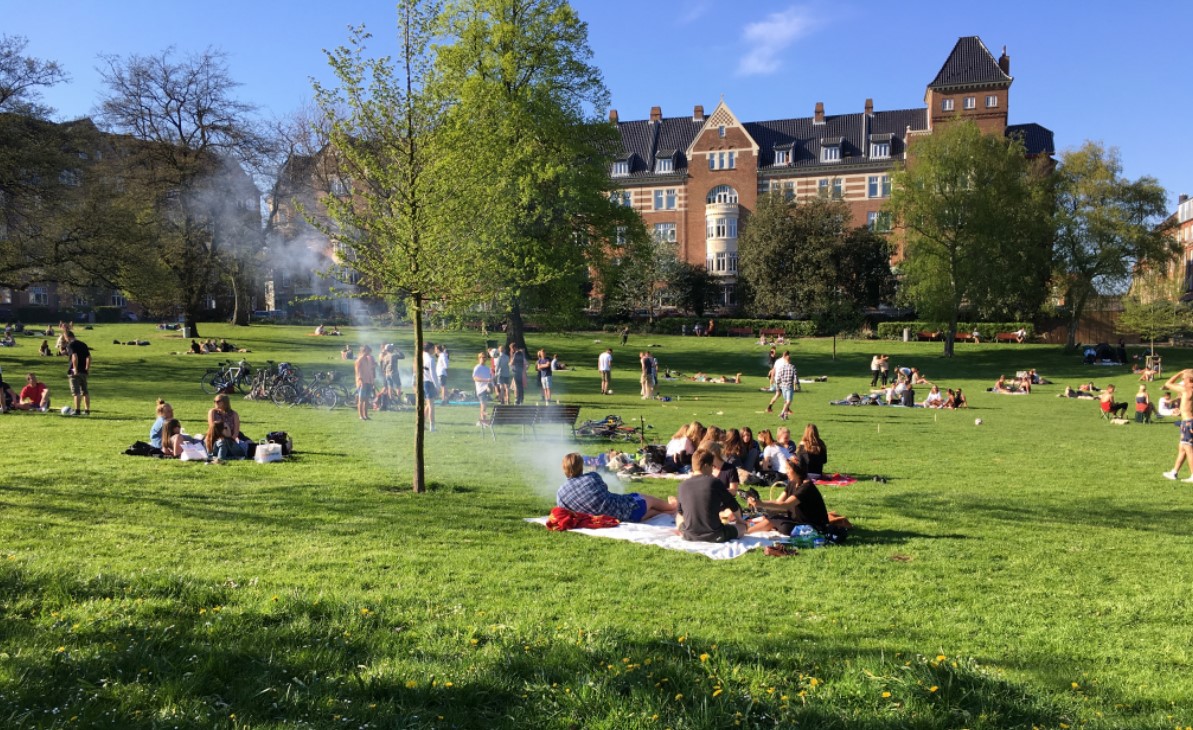Welcome back,
Remember the introduction episode when I said, “When a friend asked me on the metro if I would be interested in moving to Denmark for uni, I got excited right away.” well today I am going to talk to that friend.
Let me introduce you to today’s guest, Beni, his story is another exceptional one, just like the previous ones, but it stands out from the rest since he did not finish his study-abroad journey and returned home after the first year. We were high school classmates for 5 years and started our Bachelor’s degree in Denmark together. He made my first year abroad a whole lot easier and for sure unforgettable, just like our city trip to Aarhus in May 2016, when we walked all day to see every little corner of the city. (See the image above from one of our stops.)
The Danish education system is very different from the one in Hungary and the rest of the world, so while I have studied there a lot of people struggled to adapt to that completely new way of teaching as it requires a lot of autonomy and independent learning. Let’s see how Beni’s story matches up with this.
Beni started his BA in Denmark as a retail design and management student at VIA University, however, returned home and started over at Szent István University’s Ybl Miklós Faculty of Architecture and Civil Engineering, as a Civil engineering student, from which he only has days left as he is handing in his final project in 2 weeks.
When did you first start thinking about studying abroad and why?
B: Probably in the last year of high school because there was a presentation about possibilities in Denmark and The Netherlands and it intrigued me so I decided to take a look and see if there is a course which I would like. I ended up choosing retail design and management in furniture and fashion. I thought maybe it would be better to go abroad and see what the international view of retail design and management is like. I decided to go for it and still if I didn’t like it, I could always come back because I applied to Hungary as well.
Was it more the course or the adventure of studying abroad that convinced you in the end?
B: I decided because of both, in the beginning, I liked the idea of the course but the adventure part was a bigger deal.
The next question is a Reader’s question, coming from Instagram. When was the point when you realized it wasn’t for you and you want to return home?
B: The course was supposed to be about furniture and fashion, and I was more interested in furniture but they didn’t really talk about furniture, it wasn’t that specific. There is an expression which says that the Hungarian school system shapes racehorses and I’m totally a racehorse. I like when they give me a bigger task or a bigger problem to solve. I didn’t feel that in Denmark, it was hard to study on your own and search for possibilities. So when I realized that it’s not like that at all, that’s when I started thinking that it might not be challenging enough for me and that was around the end of the first semester, after the exam.
Do you prefer more score based testing and classes where you can be graded?
B: It’s not about the tests. It’s more about the tasks and what you are talking about in classes. So we had those kinds of classes in Denmark, where we had a presentation then we could talk about it, but it’s not full of information. I felt like you can’t get the knowledge from the classes what you would need in real life. It seemed like a teaser to things we could learn but we didn’t.
Denmark prides itself of being very practice-based and less theoretical, in my experience projects mattered more than anything, how you can apply all the theories, that is why we never even had sat down exams only hand-ins and presentations. Do you think it was more practical? You didn’t even feel challenged in that way?
B: It was practical, but practical in slow motion. I did not feel challenged in that way either, because we had plenty of time to do those things. The structure of the classes was not for my liking either, the semesters were divided into projects instead of a lesson plan that takes 4-5 classes through the whole semester and that was another reason why I decided to come home.
If the structure would have been different or if you would have felt like they give you more knowledge that you could use later and they would refer back to projects after it is over, do you think you would have stayed then?
B: I started thinking about it at the end of the first semester, but then I thought that maybe the next semester would be harder because the first semester is a warm-up, they introduce you to all the subject, talk about a bunch of different things. Maybe if it gets harder and harder and it builds on your knowledge, what have you gained in the semesters before it would be better, but it did not feel like that. So I guess if it would have built more on each other then I would have stayed.
One year in a completely new environment gives a lot of possibilities to grow and learn. What do you think you brought home, what are some things you have learnt during your Denmark days?
B: I never lived on my own before so Denmark was a stepping stone into adulthood and self-growth and I became even more open-minded. I was ready to try even more traditional dishes from all around the world, it was fun to learn about other cultures and traditions by learning new words from our flatmates and other friends, participating in their traditions etc. It became easier to approach people for help if I needed even if it is only asking for direction on the street. It was a great experience because you could see and learn from other people’s perspectives and their view of the world. I think that’s the biggest thing.
Even if the education system is not the best fit for you, do you think you have learnt anything from the school?
B: In Denmark, most of the projects are in groups so I have learned a lot about working with people and group dynamics. We took the Belbin test which describes which role you play in group settings and how you can work best in a real team. It’s fun to see which person takes which parts of the group. I am a “shaper”, which is about leadership and when I started uni in Hungary I ended up in the Student Council and after one year, I became the President of Student Council in my faculty. So that was fun to see that the test was true and there is so much that you can learn from it.
Do you use your time at VIA to your advantage, like using it on your CV?
B: It’s also me so yes, I put on my CV and LinkedIn. Studying abroad is an invaluable experience and they ask about it like, what was that and why did you decide to go? They are interested in these kinds of things. It’s a big advantage here in Hungary employers also know that I’m more open, and I can speak English confidently.
So you were on hold for the Hungarian degree while you were in Denmark, right? Would have stayed if you wouldn’t have had that plan B where you can just start uni without going through the application process again?
B: I think I would have just applied to another school. But it’s difficult to say about because I got into Erasmus in Milan for 3rd semester. I would have probably gone to Milan and see how do they do things about retail design and management. Then I would see the world differently because Milan seems more like the Hungarian structure so I think I would have just finished the second year to earn my AP degree.
What about your degree now, why did you choose civil engineering?
B: My original course was logistics, but after having some classes on that at VIA I knew I wouldn’t want to do that so I started looking for something else. In high school, I was thinking about architecture but in Hungary, it’s not really about designing it’s more about the structure of the building and not the creative part. For a while, I was proceeding to be able to change to product design in another university, but that seemed too small. Then I went to the freshman camp of the University of Civil Engineering and I really liked the team we had there. They also pointed it out that we can design bridges and that was very exciting and something I wanted to do. So that’s why I decided that I would pursue that degree.
So now that you are almost done with your civil engineering degree, do you think you made the right decision about not finishing retail design and management?
B: I think I did. Even though I lost the ECTS points, because I had to fly home before the final exam at the end of the semester, so my year did not get recognized I wouldn’t change my decision. Maybe I would change my decision about civil engineering but not the coming home part.
Are you planning to change paths again to study something different? Have you considered studying abroad?
B: My faculty is about planning all kinds of structures and after my internships and working sometime I realized I would not want to work in front of the computer 40 hours a week. So I applied for masters and I am thinking about going abroad with Erasmus during my degree. Unfortunately, most of the foreign universities I was interested in have already closed their applications in November or some in February. I am in my last semester and I had a lot of things going on so I wasn’t able to apply for a full degree abroad.
What countries were you looking at?
B: I was thinking about going somewhere where English is the main language, so I was looking at courses in the US and since I have family in Canada, I also took a look on those and then in Europe I was considering Scotland. I liked the experience of living abroad so I wanted to live it again.
When you say you want to live it again are you considering other ways as well? You have mentioned doing a semester abroad during masters, what about working or anything else?
B: I am constantly looking for jobs and other possibilities abroad, I also wanted to do my internship somewhere outside of Hungary but I wasn’t able to due to my student council responsibilities. But, yes, I want to live abroad for a while maybe even for a lifetime who knows.
That concludes Beni’s journey from Hungary to Denmark and then back home again. It is important to realize when something is not the right fit for you, as we discussed with Martyna as well in a previous episode it is never too late to change your mind until you do what you feel is right for you at the moment. Beni knew this way of learning he could not reach what his goals are so he decided to stop his degree and that’s okay.
To summarize our talk I have made a little video listing a few things that you should ask yourself before going for an international degree, hope it helps to make your decision easier.
See you on the next one,
Eszter



